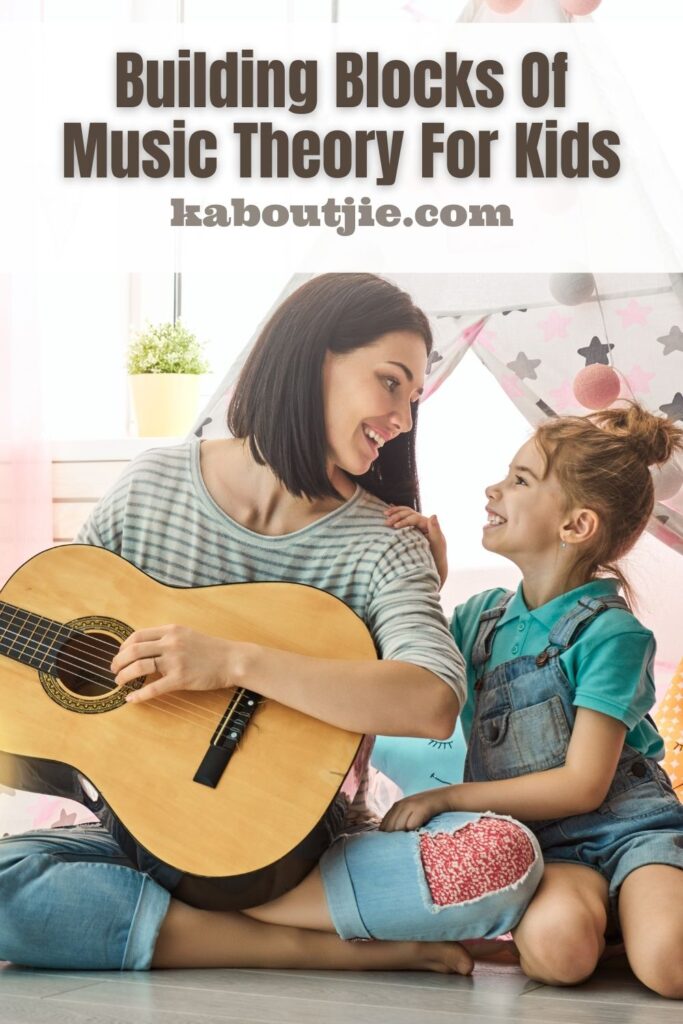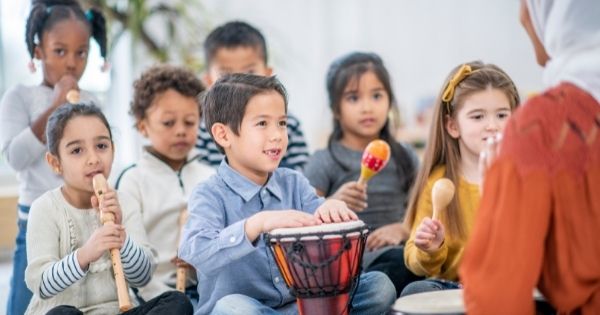There’s no two ways about it, kids love music.
For many kids, that starts and ends with jumping around the room with their friends to their favorite Disney songs.
However, if that interest is nurtured, you can easily help them come to a higher level of appreciation for music, and get them ready to learn an instrument and start a life long love affair with music.
While typically most children don’t start to learn a musical instrument until they are 7 or later, that is largely due to their developing eye hand coordination. On the other hand (pardon the pun), they can start learning a little music theory at a much younger age as it doesn’t require any more than understanding some of the key building blocks. They also don’t need to express that themselves using an instrument – they can just use it to enjoy the music they’re listening to.
In this article, we aim to help answer some of your questions about music theory and your child, and decide if it’s right for you – and if so, where to start!

What Is Music Theory?
At it’s foundation, music theory is just a system for understanding why the bits of music that sound good together sound good together.
Music theory provides a framework and a language to better understand what’s happening in a piece of music. As you transition from listening to music to writing your own music, it also serves as a on how to structure chords and melodies together in a way that’s musically pleasing, and helps to convey the mood you’re looking for.
For example, in scale theory there is a concept called “the modes” which are just collections of different notes in a scale. Different scales have different moods – for example the Ionian mode is happy and upbeat, whereas the Aeolian mode is sad, then the Lydian mode is mysterious while the Phrygian mode has an eastern flair.
All of this can be easily discussed by speaking in terms of music theory, and as you provide these building blocks to your kids, you help them to better understand what they’re hearing and why they like it, which opens avenues for them to identify more music they enjoy.
At What Age Can You Teach Kids Music Theory?
While most children don’t have the coordination for formal music lessons until about the age of seven, or even as late as nine, you can start with music theory from the age of 4.
At this age they typically have much better memory and a rapidly growing vocabulary, and just as they’re learning reading, writing, basic science and everything else at school, their brains are primed to start off learning some of the more basic concepts of music theory, taught through the music they already love.
One of the benefits of starting younger with theory is that, once the child is old enough to start instrument lessons, they will have a solid foundation of music theory and a clear vision of where they’re trying to go with the instrument, instead of trying to learn both the theory and practical aspect of the instrument at once.

What Are Some Of The Key Concepts For Young Kids?
The simplest way to start kids off with music theory is the major scale – the same DO, RE, MI, FA, SOL, LA, TI, DO Rogers and Hammerstein scale we all learned as kids from The Sound Of Music. Not only is it easy to teach due to being in a fun song for kids to bounce around to, it teaches them the fundamental scale from which pretty much all of music theory derives.
With this seven note scale and the accompanying catchy tune as a building block, you can teach kids about:
- high / low (pitch)
- loud / quiet (dynamics)
- smooth / bumpy (articulation)
- steps / jumps (intervals)
- long / short (duration)
- regular / irregular (rhythms and patterns)
Once kids have latched on to this small musical vocabulary, it’s easy to go deeper and teach them about all of the progressively more complicated concepts that will help them move towards becoming musically fluent.
What Are The Best Ways To Teach Music Theory To Kids?
If the word “theory” makes you feel like you’ll be switching kids off, there are a ton of ways around it.
Just like anything with kids, the way you teach them is by making the whole thing as fun as possible – you don’t sit them down and make them watch you draw out musical notation on a chalk board, you get them up and active, make them jump around, make a game out of the whole thing.
Here are just a couple of ideas to get you started:
Teach Students Theory For Their Favorite Songs
This is an easy one, pick some of the ubiquitous Disney songs that every child loves these days and explain it to them in terms of music theory – there are no shortage of guides online.
Incorporate Movement
This is great for teaching them different note values for example quarter notes are walking notes, eight notes are jogging notes, half notes are crawling notes and so forth. Help them to feel the pace of the music.
Music Theory Treasure Hunt
Another fun one for small kids – hide musical notes around the classroom or playground, and then have them rearrange them in a logical order of the major scale or whatever other scale you are learning. The kids get the benefit of running around trying to find the notes, plus the little musical puzzle at the end as they arrange the notes.
Of course, some of these work better in a group setting and some work better one on one – experiment and figure out what works best for your audience!
Conclusion
Teaching music theory to your kids at a young age opens them up to a language that they can use their whole lives. If they start early with music theory, before they have the coordination to play an instrument, they will start into music lessons with an incredible foundation on which to build, something that will translate to any instrument and any style of music. The sky’s the limit!
 Kaboutjie SA Mommy Blogs by Lynne Huysamen
Kaboutjie SA Mommy Blogs by Lynne Huysamen





Music and instruments so important in the development of children. I would love my child to play an instrument.
You are so right Hope! My daughter got a guitar for her 10th birthday and my hubby is teaching her how to play which is amazing since I don’t know how to play any musical instruments!